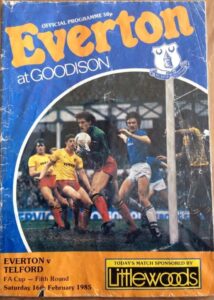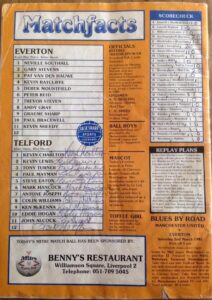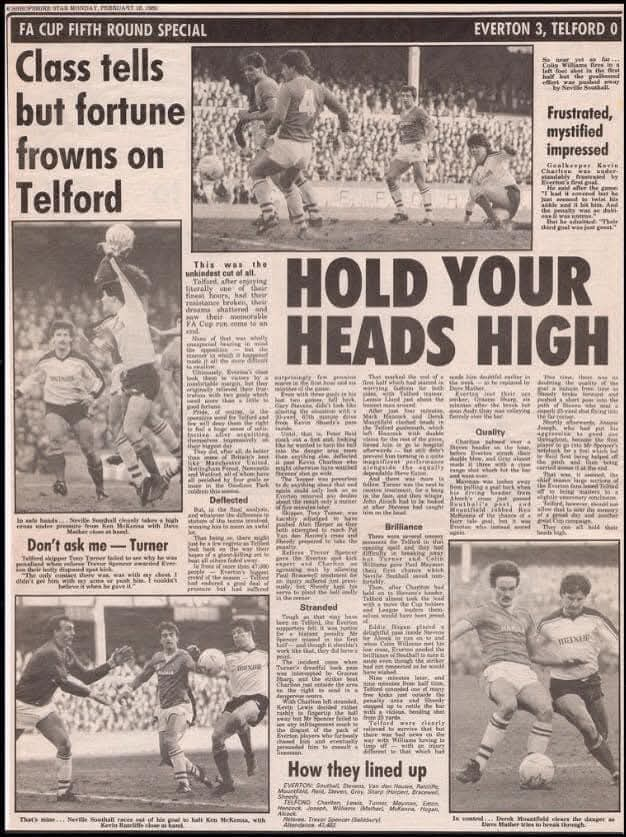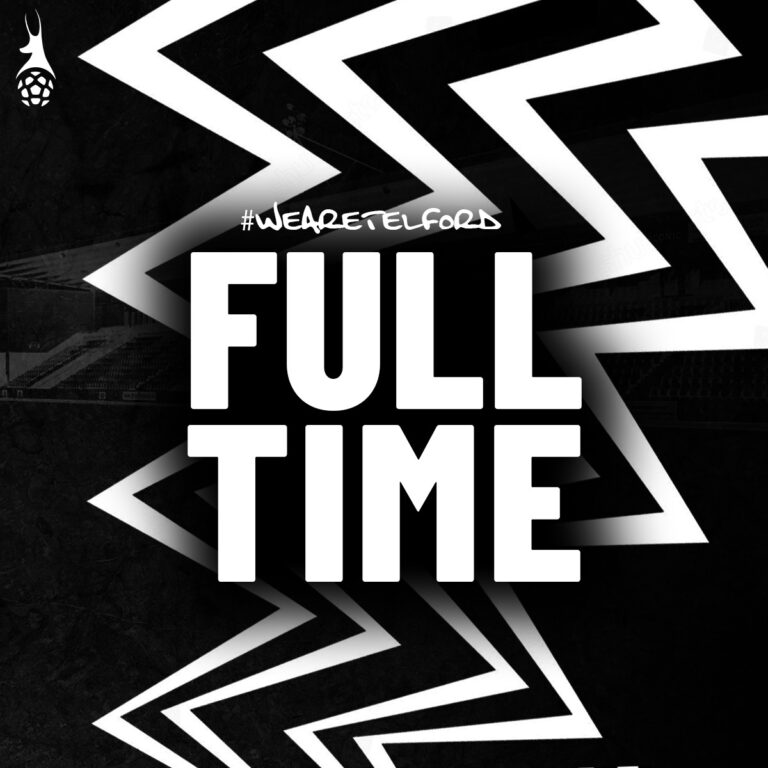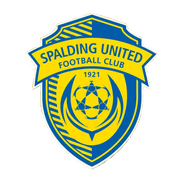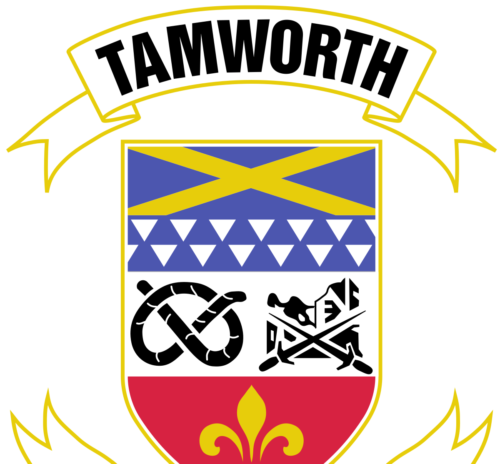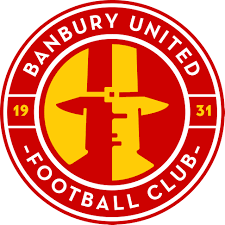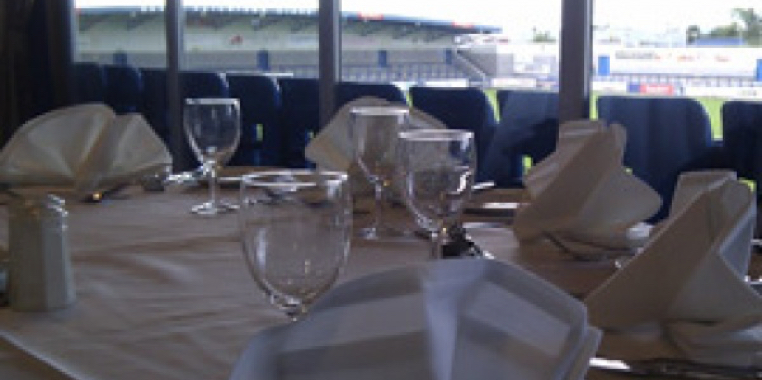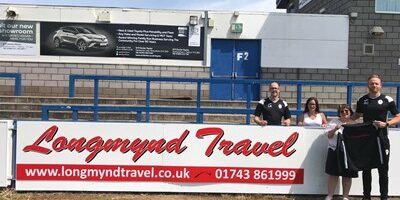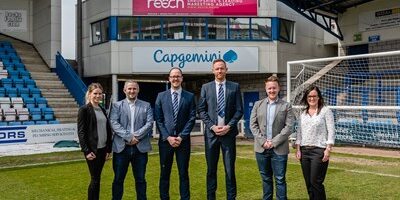We were living through some of the most extraordinary times, possibly without knowing it…
As a sixteen-year-old fan, it didn’t cross my mind to savour the events of February 1985. Hindsight is a wonderful thing. Forty years later, the names still trip off the tongue…
Charlton, Lewis, Turner, Mayman, Eaton, Hancock, Joseph, Williams, McKenna, Hogan, Alcock, Mather.
The Telford United team that defeated four Football League teams en route to the FA Cup fifth round wouldn’t have thought about it at the time, I’m sure; however, when they strode out at Goodison Park on a bright but chilly afternoon, they were stepping not only into uncharted territory but also a form of sporting immortality.
Older Bucks fans venerate them, whilst younger Bucks fans are likely to have heard them spoken about by their relatives, who may have gone all misty-eyed in recalling the day Telford took on the league champions-elect, Everton.
Ken McKenna and John Alcock were both members of that notable Telford side and while reaching the FA Cup fifth round might have been the most memorable of their exploits, it was far from the only one. Those of us old enough to have been there or to remember that team were spoilt, with regular FA Cup runs and trips to Wembley in the FA Trophy happening virtually every season.
I spoke with Ken and John ahead of the anniversary of the Everton tie, barely believing that four decades have passed since that day.
Ken admitted that although the day was memorable, the passage of time since then hadn’t registered because “You’ve got so many other things going on.” Ken, now a grandfather to four grandchildren, is semi-retired, although still involved in football, in a scouting role for The New Saints. Ken had been at Telford for less than a year when he and his teammates earned the opportunity to face Ken’s boyhood team and the side he still supports now: Everton FC.
KM: “From a personal point of view, you know, I was a late developer, I never played any youth football, and then to sort of sign for Telford and then in my first season, I get to the fifth round of the FA Cup, and I’ve arguably the best day of my life, playing against Everton.”
Although some of Ken’s teammates may count it as the highlight of their footballing careers, Ken was just twenty-four and was to progress into the professional game. With that in mind, I suggested that, at the very least, it was the highlight of his football career up to that point.
KM: “Oh yeah. The thing is, I went into management, and I was very fortunate to manage against Manchester City in the UEFA Cup and Liverpool in the Champions League. So I was fortunate enough, you know, with TNS, to have some good occasions like that. When I was at Morecambe, we played Newcastle and Sunderland, which were big games.”
Ken’s Telford debut is still stuck in my mind forty years later. As a teenage fan, I would document each game I attended in a book, and I distinctly recall Ken coming on as a substitute in a pre-season friendly under the lights at the old Buck’s Head ground. He wasn’t announced, and my record of the game contained a blank against the unidentified forward with the bustling style.
He wasn’t to be a mystery for much longer. Stan Storton signed Ken from Poulton Victoria of the West Cheshire League, setting him on the path to that meeting with his idols.
Ken recalled those events.
KM: “It was strange. To be a footballer is not just about having ability; there’s a lot of mental stuff to it, and a lot of people who have come through academies and what have you. They build up to that. I was coming to football as a complete outsider, and then, all of a sudden, you know, I’m West Cheshire, then I have a little go at Tranmere, then I go back to West Cheshire, and then I get a phone call to ask “Would you want to go and have a little trial for Telford United? For me, it was like, I don’t know… it was massive. It was such a big step up from where I’d been at, and really, at 24, you know what I mean, it was fairly late on really, but it was a massive thing. I can still remember going in and walking down the tunnel and seeing the little Maxell stand and what have you, and thinking, “Do you know what? I quite like it.” I did a little bit of training and felt at home, and it seemed very good, so I count myself as very fortunate.”
Fortune may have played some part, but Stan Storton had an eye for talent, and his record suggests he wouldn’t have brought Ken to the club unless he felt he deserved to be there. The same applies to defender Mark Hancock, another recruit from the same level as Ken, against whom Ken has played in the past.
The pair slotted into an already established team, McKenna, in competition for strikers Dave Mather and Colin Williams, and Hancock, as the replacement for former captain Alan Walker, who was sold to Lincoln City. Ironically, Williams scored twice in a replay to defeat Lincoln en route to playing Everton, with Walker scoring Lincoln’s reply.
Ken’s recollection of the team of ’85 was as positive as you’d expect.
KM: “I enjoyed it, playing in a very good team and with some very good players. It was such a well-balanced team, you know? It had a bit of everything. In those days, it was 4-4-2, and we had two great wide players, one a winger (John Alcock) and one more like a wide player (Paul Mayman). A big midfield – Antone (Joseph) could sit there and tackle, and we had Eddie (Hogan), who was a great footballer, so the balance of the team was very good. Stan was very good at putting teams together.”
Ken attracted a lot of media attention for being an Everton fan. The postponement of their Saturday fourth-round tie at Darlington meant that Telford knew they’d play Everton if they got through against the Quakers. For Ken, that meant the prospect of facing players he was actively travelling to support when he was able to.
KM: “Oh, it was unbelievable. Bearing in mind, at that time, I was following Everton as well, you know? I went to Rotterdam with my family (European Cup Winners Cup final vs Rapid Vienna) and was at Wembley for the cup final (vs Manchester United). If we were going to get a day off or not playing on a Saturday or something, I was still an Everton fan. I was getting to as many games as I could, so it was a bit strange, playing against them and being such a big supporter, you know?”
Did being a supporter help when it came to playing against them? Had Ken gained insight into how he might face the challenge?
KM: “Do you know what? I think on the day, I wasn’t great, and I think I was a little bit in awe with all of the occasion and with being so close to it if that makes sense? I think if Colin Williams hadn’t gone off earlier, I might have got dragged off! Colin went off, and Dave Mather, who was a great player, came on. You know, you’re very lucky when you’ve got players like Colin Williams and Dave Mather. Superb strikers. I think if Colin hadn’t gone off, I might not have lasted the game, but I did and I enjoyed it, but it was a bit strange for me, personally. It got a little bit tasty and I never really got involved as much as I probably should have done.”
The ’tastiness’ Ken referred to was, unfortunately, a rather bitter taste as far as Telford was concerned. An injury to midfielder Peter Reid, inflicted by Antone Joseph, meant Reid had to be taken off the field, rather bizarrely piggy-backed off under a grey blanket, and Evertonian displeasure at seeing one of their linchpins hurt meant that Telford didn’t get the ovation they perhaps deserved.
KM: “Yeah, it was difficult because Telford as a football team was renowned for football; we weren’t renowned for the physical approach to the game, and if you actually ever look at the highlights, you’ll see they (Everton) are quite physical. I was at the Bayern Munich game at home, and as much as Everton was a great football team, they were also very, very physical and very sharp. With their long throw from the right and, you know… they could mix it. Maybe the perception was that we were a non-league team, so it was going to be physical.”
Ken’s memory of events was that Telford was responding to the opposition.
KM: “I can remember, on the day, I don’t know whether it was Antone or someone who said “This is getting a bit, you know… they’re getting stuck in. Our back four could all look after themselves, and if you looked at Antone, you know? They’ve got Pat Van Den Hauwe and people like that, who could all be very physical. It’s probably Everton’s best-ever team and had a little bit of everything, and we’re a non-league team that’s got to the fifth round of the FA Cup. I remember Howard Kendall (the Everton manager) was very complimentary in his programme notes. He said we were a good side and all, but the game turned into… it got a little bit physical, and as I say, from a personal point of view, I was a little bit quiet on the day. Normally, I like that type of game, but it was a little bit surreal. I was playing against players that I normally followed, and I was thinking, “I can’t kick him! It was a little bit bizarre; it wasn’t one of my better games, but to hold that team for seventy minutes was an unbelievable achievement.”
Telford stayed strong until halfway through the second half when a Gary Stevens shot cruelly deceived Kevin Charlton, swiftly followed by a penalty award that rankles with Ken even now.
KM: “The first goal’s a deflection, but then the second one is never a penalty in a million years. They maybe should have had one in the first half, but he (referee Trevor Spencer) missed that, but then he gave a penalty in the second half that was never the penalty in a million years, but, you know, we have a good chance. Corky (Mayman) had a header and nearly got us back into it, but then the last goal (Trevor Steven) was fantastic. Obviously, getting beaten 3-0 by arguably Everton’s best-ever team was a great performance, but it was a little bit sour to be coming off, and you’re getting booed after such a good cup run. It was a little bit of a shame that we got booed off, but having said that, I’d rather get booed off after a tight game like that than get clapped off after getting beat ten-nil!”
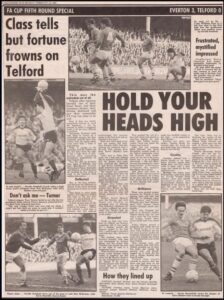
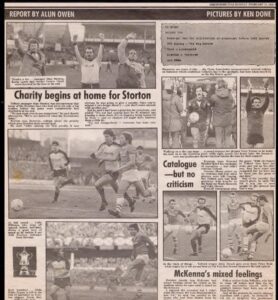
John Alcock’s success with Telford came from being an established team member. Signed by Geoff, now Sir Geoff Hurst, from Eastwood Hanley, he earned an FA Trophy winners medal under Stan Storton in 1983, and his distinctive style of play on the left-wing, beating his man on the outside before whipping in a curling cross, played a huge role in what Telford achieved, and we spoke about those days.
JA: “When people say to me about the Everton game, the build-up for the Everton game and all that kind of thing started for me once we got the draw at Darlington (1-1). The draw was made so we knew whoever won the replay was going to play Everton. On the night we played (the Darlington replay)… there was always a better atmosphere at night. Don’t ask me why, but it was just the atmosphere at the Buck’s Head when you played at night. There were eight to ten thousand there, and the three goals we scored… I could go on and on about the Everton game, but for me, the Darlington game was where the build-up started for the Everton game, and I’ve always said that.”
John freely admitted that he allows himself a trip down memory lane, or Gwladys Street, given that it’s Everton.
JA: “I’ve still got the DVD of the Everton game, and I do watch it, and the honest truth is, and people laugh at this, but after about ten or fifteen minutes, Colin Williams should have scored. Eddie (Hogan) knocked me through; I crossed it over, and Colin, who, to be fair, wasn’t fully fit and came off at half-time for Dave Mather… if he could have buried that one from seven or eight yards, we’d have gone one-nil up and then you never know, because I believe we were quite capable of getting a draw.”
I mentioned my conversation with Ken; I’d asked him, with the game at nil-nil with twenty minutes remaining, whether he allowed himself to think they could be on for a replay by holding the FA Cup holders. Ken hadn’t, but I asked John the same question.
JA: “I’m not being funny, but if you look at the highlights, the best two chances were that one (Williams) and then in the second half, we’ve a throw-in down the bottom end; it’s thrown in, I got the ball back and went past the full-back, Stevens. I knocked it, Paul Mayman came flying in with a header from five yards, and it was just wide. Those were the two chances and we could have got a draw because the second goal was, as you are well aware, a dodgy penalty and the third one… well.”
Everton’s second goal, the penalty that both Ken and John dispute to this day was given for a push by left-back Tony Turner and converted by Kevin Sheedy. It eased the match situation considerably for the Toffees and, as John revealed, also changed the Telford mindset.
JA: “After the second goal, we said “Forget it, we are going to go out in a blaze of glory or whatever, and we just went for it, but their third goal was a cracking goal.”
Trevor Steven added the third Everton goal with an angled shot from the edge of the box that arrowed across Kevin Charlton and into the top corner. John had been up against Stevens and Steven, a pair who, a little over a year later, were operating in tandem for England at the 1986 World Cup in Mexico, something I mentioned.
JA: “Well, I can name the side they played on the day, and I think every player was an international apart from Derek Mountfield. It was Gary Stevens, Derek Mountfield, Pat Van Den Hauwe, and Ratcliffe (Kevin), all internationals. Bracewell was an international, Peter Reid, Trevor Steven, Sheedy, and then up front with Graham Sharp and Andy Gray.”
John’s recollection missed goalkeeper Neville Southall, the Wales and Everton legend, but did prompt some other recollections,
JA: “As I’m sure Antone will tell you, we got booed off the pitch. Antone tackled Reidy right at the end. It was a bit late. Antone will tell you about that one; Reidy got carried off, and we got booed off. It was typical of Antone because he was the hard man of the team. He’d win it, give the ball to Eddie and let Eddie play, or give it to Paul or whoever. Antone was there to tidy up, whether it was legitimate or not. Obviously, Eddie and the likes of Paul sometimes weren’t the best at defending, so Antone was there just holding it together, like Rodri of Man City.”
John’s comparison was one I’m sure Antone would accept, and who knows? Perhaps Rodri would welcome a comparison to Antone Joseph?
John’s undoubted affection for Telford is evident. He ran through a list of names inside an old programme, recounting the likes of chairman Gerald Smith, his fellow board members and club staff, and he had a special memory of one man in particular.
JA: “The one who always made me laugh was Bob Turner (the groundsman). Bob Turner used to say to me the week before a game, “How long do you want the grass on the wings? Do you want to keep it low?”
Bob’s contribution to the team’s successes, with the fantastic Buck’s Head pitch he lovingly prepared, was a reminder that behind the team that took the field that day, there was another team off the field, just as there are today, who helped make it possible.
Although the players from the team of ‘85 justifiably receive the attention, we remember everyone at the club who played a role in delivering that special day, forty years in the past, but still alive in the hearts and memories of those fans who witnessed it.
Our big day out at Goodison Park might have been a pinnacle, but these events combine several factors. A Cup run requires a degree of luck, but the team must also be prepared to take advantage of any good fortune it receives.
The fact that the Bucks haven’t seen a Cup run quite like it in the forty years since highlights just how much the footballing stars need to align to make an event like Goodison Park in ’85 happen. The game has changed, too, and even though teams from outside the EFL have reached the fifth round and beyond, they were professional outfits.
The ’85 team and the Telford teams of that entire decade are also perhaps responsible for setting the bar for all the teams that follow, making them a tough act. Perhaps rather than comparison, the ’85 team can be an inspiration. A team that achieves great things and gives people special days can mean that your name will be remembered long after your boots have been hung up for the last time.
You might not even be conscious of it whilst it’s happening, but every team that takes to the field can be remembered for decades. You can live through some of the most extraordinary times without knowing it…
This retrospective first appeared in the AFC Telford United match programme vs Redditch United – 15th February 2025
Rich Worton – @buckswriter
